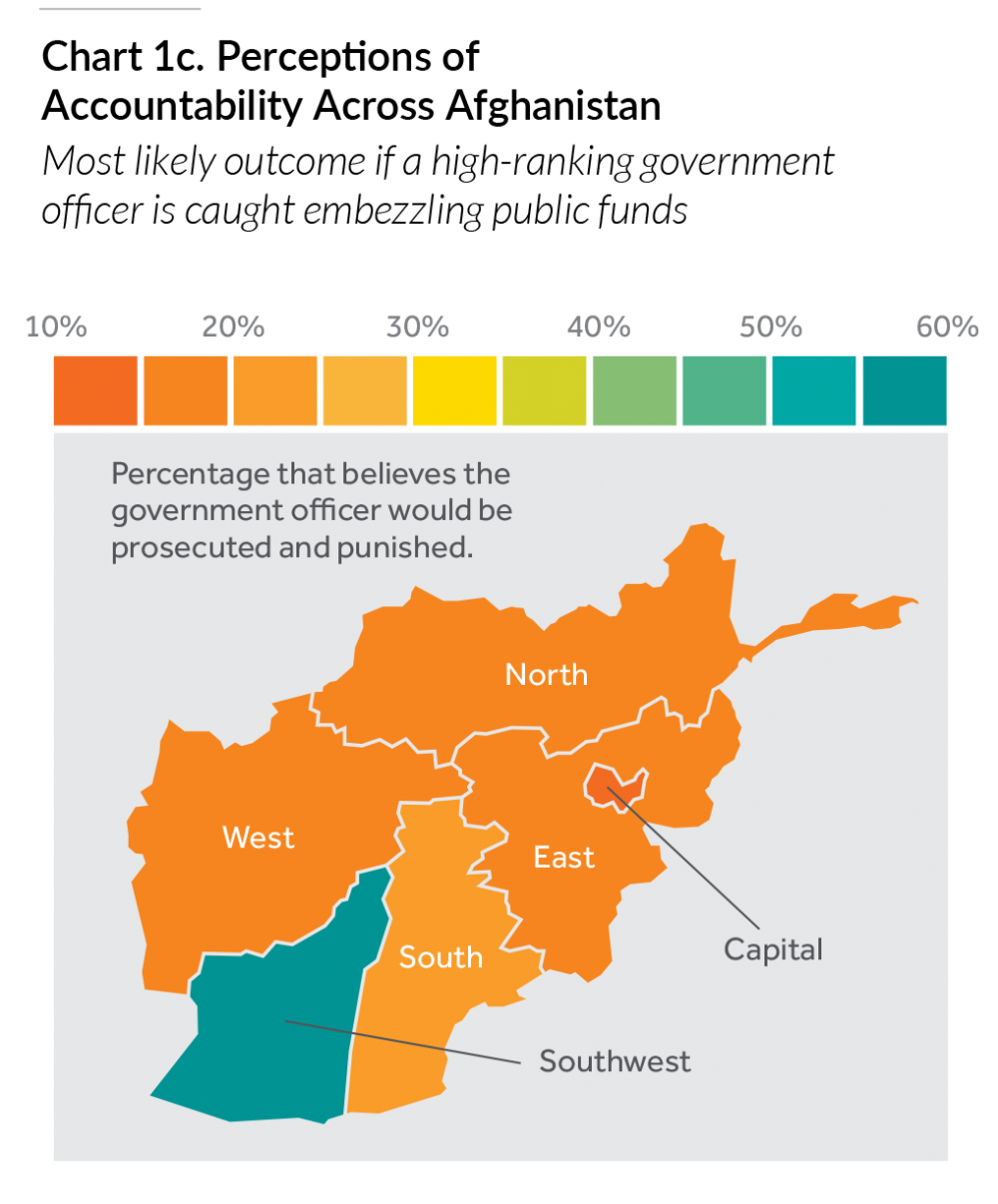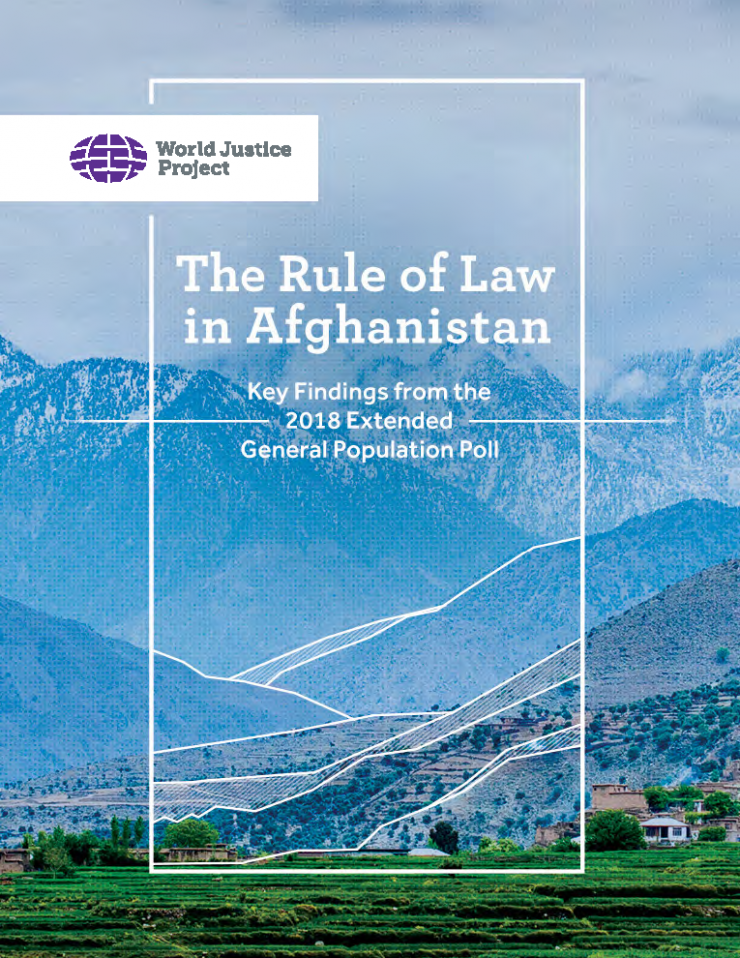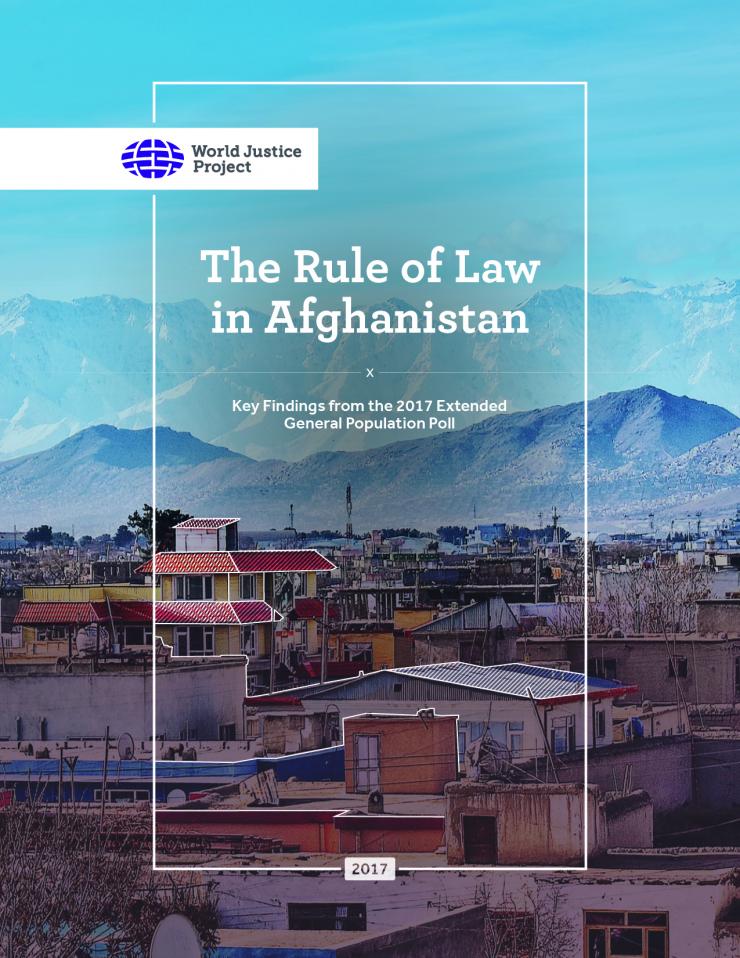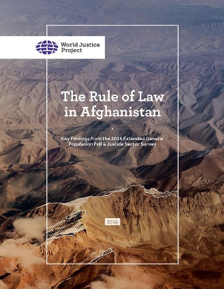The Rule of Law in Afghanistan: Key Findings from 2019 was launched on July 1, 2020. Watch the livestream of the launch event.
The Rule of Law in Afghanistan: Key Findings from 2019 report represents the experiences and perceptions of more than 17,500 Afghans interviewed over five years. View the report.
The Rule of Law in Afghanistan: Key Findings from 2019 by the World Justice Project (WJP) presents a unique portrait of the rule of law in Afghanistan through survey data collected from the general public, in-country legal practitioners, and individuals incarcerated in the Afghan prison system. The latest edition of this report presents a comprehensive summary of the rule of law situation in Afghanistan—informed by the WJP Rule of Law Index report—as well as new, in-depth findings on the performance of the criminal justice system derived from a ground-breaking survey of Afghan inmates.
Whereas the flagship WJP Rule of Law Index offers aggregate rule of law scores, this report presents disaggregated question-level data as a series of thematic briefs to highlight different facets of the rule of law as it is experienced by the population in Afghanistan. The first twelve briefs feature data derived from the WJP’s General Population Poll (GPP) and Qualified Respondents’ Questionnaires (QRQs) and highlight findings related to issues of accountability, corruption, bribery victimization, fundamental freedoms, crime, performance of the justice system, police performance, criminal courts, legal awareness, access to civil justice, women in Afghan society, and trust in institutions. The GPP was conducted via face-to-face interviews in September of 2019 to a nationally representative sample of 3,019 Afghan households. The QRQs were administered from May through September of 2019 to 24 in-country legal practitioners and academics with expertise in civil and commercial law; constitutional law, civil liberties, and criminal law; labor law; and public health.
The final seven briefs feature data derived from the WJP’s pilot Afghan Inmates Survey and provide unparalleled insights into inmates’ experiences in Afghanistan’s criminal justice system—from the moment of their arrest through the criminal trial process. These briefs explore the socio-demographics of the interviewed inmates as well as their experiences with due process during arrest, mistreatment during arrest, the post-arrest process, mistreatment during interrogation, the primary and appellate trial processes, and legal representation. The WJP's Afghan Inmates Survey was conducted via modified face-to-face interviews in December of 2019 through January of 2020 to a stratified sample of 557 men incarcerated in five prisons in Afghanistan.

Together, these briefs are designed to help illuminate rule of law strengths and weaknesses, encourage data-driven policy choices, and guide program development to strengthen the rule of law in Afghanistan.
Select key findings from the general public and legal practitioners:
- Government Accountability: There is a high perception of impunity in Afghanistan. Perceptions of government accountability vary across regions, with the Southwest region having the most positive perception of accountability and the Capital region having the least positive perception.
- Corruption Across Institutions: Afghans believe that a significant number of authorities are involved in corrupt practices. Despite a small improvement over the last year, judges were viewed as the most corrupt authority for the sixth year in a row.
- Fundamental Freedoms: While Afghans’ views on fundamental freedoms in the country have declined since 2014, perceptions of political, media, and religious freedoms have improved over the last year.
- Criminal Justice System: Afghans report low levels of confidence in the criminal justice system. Afghans were the most confident that the criminal justice system is effective in bringing people who commit crimes to justice, but were less confident in other aspects of the justice system’s performance. In-country criminal justice experts flagged corruption, lack of prosecutorial independence, inadequate protections, and lack of proper investigation methods among the biggest problems faced by criminal investigative services in Afghanistan.
- Police: Perceptions of the police are mixed in Afghanistan. Although nearly three quarters of Afghans believed that the police performed well when it came to resolving security problems in the community, fewer believed that the police acted according to law, that they are punished for violating the law, and that they respect the basic rights of suspects.
Select key findings from inmates:
- Arrest Process: Adherence to due process during arrest is weak in Afghanistan, but has improved over time. On average, inmates arrested between 2017 and 2019 were more likely to report that they were explicitly told that they were under arrest, they were informed of the reason for their arrest, they were not verbally threatened, that they were not asked for a bribe, and that they were arrested without violence compared to inmates arrested before 2017.
- Mistreatment After Arrest: It remains common that suspects in Afghanistan are not taken to official law enforcement facilities immediately after being arrested, and that they experience different forms of mistreatment during this time.
- Trial Process: Due process during criminal trials in the formal court system has improved over time in Afghanistan. The greatest improvement over time was seen in the percentage of inmates that were given the opportunity to speak during their primary and appellate trials.
- Legal Representation: Legal representation during the criminal justice process has become more common in Afghanistan over time, but many challenges remain. Although inmates are now more likely to report that they were represented by a defense attorney during their primary trial, it remains common for defense attorneys to meet their clients for the first time at the beginning of trial proceedings.
Download the Report

The Rule of Law in Afghanistan 2019 Report
Watch the Launch Video
Previous Editions

Previous Edition: The Rule of Law in Afghanistan 2018 Report

Previous Edition: The Rule of Law in Afghanistan 2017 Report


